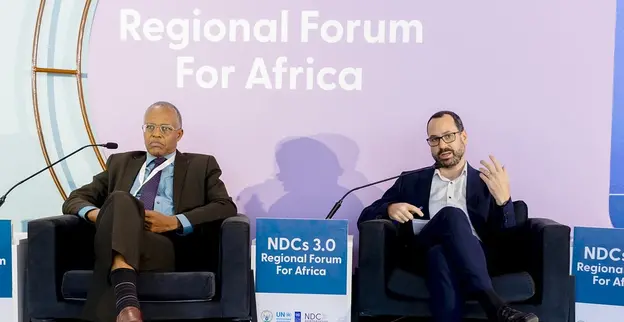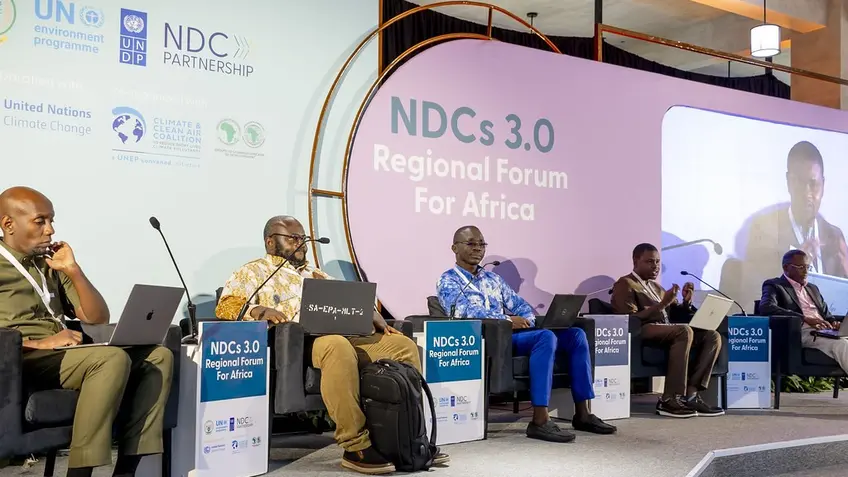Unlocking Climate Finance in Africa: Improving Access through Collaboration
As countries prepare to submit “NDCs 3.0,” the next round of Nationally Determined Contributions (NDCs) under the Paris Agreement, inadequate financing remains a major constraint to implementation. Africa, which received only 3.3% of global climate finance flows in 2021-2022, faces a significant funding gap, with flows needing to increase fourfold annually until 2030 to meet the finance required for NDC implementation.
Working to address these urgent gaps, the Center for Access to Climate Finance organized a peer exchange in Kigali, Rwanda, focused on improving access to finance for critical climate investments as defined by countries’ NDCs. The event was held during the NDC 3.0 Regional Forum for Africa, hosted by the Government of Rwanda, the NDC Partnership, UNEP, UNDP and AfDB, in collaboration with the UNFCCC Secretariat.
The forum brought together more than 150 participants from across Africa, including Taskforce on Access to Climate Finance countries — Malawi, Rwanda, Senegal, Somalia and Uganda — along with anchor funders Germany and the UK and financial institutions such as the African Development Bank. These Taskforce countries were joined by other African governments and stakeholders seeking solutions to improve finance flows to the region.
The Taskforce, launched at COP26 by the UK and Fiji as initial co-chairs, brings together climate-vulnerable developing countries and finance providers to improve access to climate finance. The Center for Access to Climate Finance, a dedicated body delivering global thought-leadership on climate finance, works closely with Taskforce pioneer countries like Somalia, Rwanda, and Uganda to test and refine new approaches to accessing and programming climate funds.
Guided by the Taskforce’s Principles and Recommendations, participants engaged in structured peer exchange, sharing practices that have helped build institutional capacity and streamline finance. These guidelines emphasize country ownership, efficient processes and increased transparency, helping align funding with national priorities and fostering stronger governance structures.
The Principles and Recommendations also encourage innovation and flexibility in funding, helping to balance the urgent needs of African nations with the nuance and practicalities of finance access.
Country-to-Country Peer Learning
At the event, countries presented case studies documenting their experiences with aligning to the Taskforce Principles and Recommendations, highlighting how this integration has enhanced their national climate finance efforts.
Uganda has established a climate finance unit to align funding with national priorities and enhance inter-ministerial collaboration. Regional coordination is strengthened through the East African Climate Finance Directors’ Meeting, initiated in 2023 by Uganda’s Ministry of Finance, Planning and Economic Development in partnership with the UK’s Foreign, Commonwealth & Development Office (FCDO), fostering dialogue on climate finance access and mobilization to meet regional NDC ambitions. Additionally, Uganda has introduced a green taxonomy with UK support to encourage sustainable investment and is digitizing finance tracking to improve transparency.
At the same time, Rwanda has been championing a shift from project-based funding toward programmatic approaches within its Green Growth and Climate Resilience Strategy. The country’s approach integrates climate finance into broader development goals, with 80% of project funding managed by local governments to ensure alignment with local priorities. Supported by various development partners like the European Union, World Bank, Germany and Sweden among others, Rwanda mobilizes large-scale finance through integrated initiatives, championing a whole-of-government and whole-of-society approach to climate action.
Somalia, a newer Taskforce member, presented its initial achievements in securing climate funds despite facing continued challenges, including capacity and coordination gaps across ministries. Support from multilateral sources, such as the Green Climate Fund (GCF) and the Global Environment Facility (GEF), has provided Somalia with the resources to advance its NDC targets. Moreover, as it advances its climate finance capabilities, the country is building the institutional foundation necessary for accessing broader finance streams and implementing its climate goals.

Challenges and Opportunities in Accessing Climate Finance in Africa
Currently, only 23% of Africa’s NDC investment needs are being met, and as countries prepare to submit more ambitious NDCs by 2025, the gap is set to widen. In addition, financing remains unevenly distributed, with ten African countries receiving half of all climate funds, while the most vulnerable receive only 10%, intensifying the climate risk disparity across the continent.
Many African countries depend on international finance, yet most of the funds come in the form of debt, adding to the debt-burden in an already vulnerable region. Access to multilateral climate funds, which are instrumental in catalyzing private finance, is still very low and contributes less than 2% of Africa’s total climate finance. Furthermore, Africa’s domestic capital — around USD 2.4 trillion in bank, insurance and pension assets — highlights the potential for strengthening local investments to complement international funding, though tapping into these domestic resources requires building capacity, data systems and risk reduction mechanisms.
At the event in Kigali, participants highlighted numerous common barriers, notably the lengthy process from project design through approval and disbursement. Many, including Burkina Faso and Togo, emphasized the importance of preparatory studies —such as those led by the West African Development Bank —in securing access to finance.
Governance and coordination also emerged as ongoing challenges. Countries with overlapping ministry roles face additional obstacles in managing climate finance. In contrast, those with more streamlined governance models often see finance ministries focused on mobilization, while environment ministries handle the technical aspects of climate project development and implementation.
Several other key topics emerged from the discussions, highlighting priority areas to address moving forward. Specifically, participants highlighted the need for:
- A greater shift towards programmatic approaches for long-term climate action
- Designing transnational programs to increase regional collaboration and coherence
- Better alignment between NDC review cycles, international finance flows and national and regional priorities
- Increasing national expertise through university programs, training and mentorship to reduce dependency on external consultants
- Improved transparency and Monitoring, Reporting and Verification (MRV) systems
NDC Partnership Supports Countries in Unlocking Finance
The climate finance peer exchange in Kigali provided a valuable platform for sharing best practices and fostering collaboration among countries and partners. The Center for Access to Climate Finance, hosted by the NDC Partnership Support Unit, amplifies these insights to advance climate finance efforts and help overcome financing barriers.
With support from the Partnership, countries strengthen their capacity to strategically plan, prioritize and mobilize investments aligned with their climate-development priorities. This assistance equips countries to attract public, private and blended finance sources, ensuring their NDCs are investable and implemented effectively.
Read more about the Partnership’s important climate finance work here. The “Unlocks Finance” Route is also available on the NDC 3.0 Navigator, offering strategies for countries to improve access to climate finance as they develop and implement their NDCs 3.0.
